Don't wanna be here? Send us removal request.
Text
Deprived Thought
Project description: For this course Principles of Public Relations, we had to make a poster as a way of communicating with the targeted audiences through posters. We had to develop our project based on the Curriculum integration (CI) theme of that semester which was Pedagogy of the Oppressed. We tried to connect out poster with the theme of the CI. After making the poster it was exhibited in the Shilpokala Academy.
Project justification: We made the poster as a way of communicating with our target audience. As the theme was Pedagogy of the oppressed, we chose the topic Deprived Thought. This indicates how our thoughts are controlled by the education system and how we are chained by it.
Following is the poster we made-

Self-reflection:
1) how to make a poster
2) basic use of photoshop
3) communicating through posters
0 notes
Text
Resilence
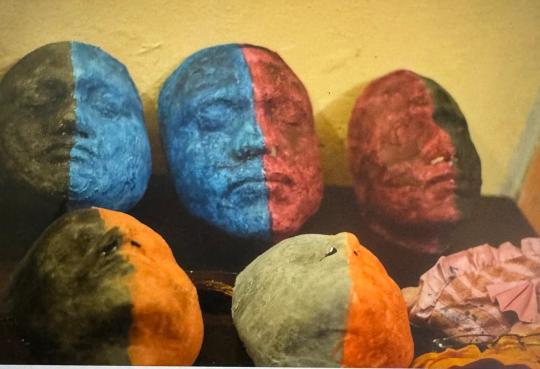
Project description: For the course Mass communication we had to make a mask as a part of mass communication. It was a group task and we had to follow the curriculum Integration theme. The theme for that semester was Resilience and we made our mask according to the theme. The mask making also included the task of writing a report on the mask that we made.
Project justification: The topic we chose for making the mask had to be related to the CI theme of that semester which was Resilience. We tried to show that how to be resilient when someone is bullied.
The mask we created:
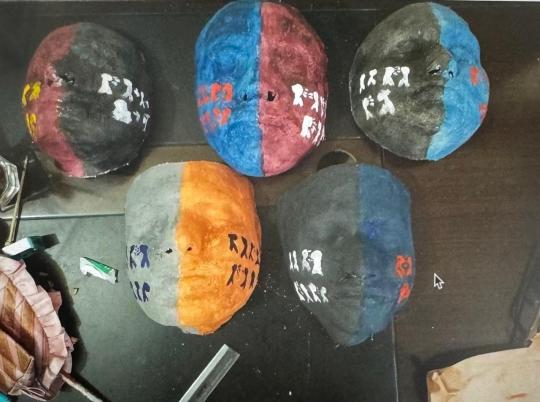
Essay on the project:
As a task in term of resilient we are going to represent that how to be resilient when someone is bullied.
Simply bullying means dominate others. If we describe it, it becomes that dominating someone by force, threat, or coercion to abuse, intimidate, or through aggressive behavior.
In this case if a person who is bullied he tries to resist those who used to bully him/her, they face more bullying. Cause a bully person wins when that bullied person feels sick.
So, it would be better if they just ignore the bully person by being normal towards that bully and by just being not so serious to that person. After All he’s a bully.
After making a Face mask we are going to paint it in brown and gray with a smiley face. Then we are going to draw some bully lines on the gray part, and some not being serious lines on the brown side. And yeah, After all gray is the color of isolation.
Self-reflection: through this project I learned –
how to make a mask
how to use masks a method of communication
effective use of mass communication
0 notes
Text
Watchdog

Project Description: For this course we had to make a Video Art related with the Curriculum Integration theme which was Youth Empowerment. This video art needed to have multiple meanings. So, I decided to name my Video Art Youth Reflection matching with the CI theme.
Project Justification: As we had to make a video art as a way to communicate through videos, through this video art I wanted to show a youth empowerment through obstacles, social movement through youth empowerment and new rules established by youth to change society positively.
Video Link: https://www.youtube.com/watch?v=qAXvXjFeFZU
Idea:
I wanted to show a youth empowering through obstacles, social movement through youth empowerment and new rules established by youth to change the society positively. Visualization: In the video I used a black box to show a black wall and a green toy car that is moved a hand which gets obstructed by the wall. Than a black car joins the green car and breaks the obstacle.
Messages:
1) In this angle the box represents obstacles the society. The running car represents the power of the youth which breaks the obstacles of the society.
2) In the second angle, the green car represents the youth and the box represents mental obstacle of the youth. The black car representing the helping hand, helps the green car break throw the mental obstacle.
3) In the last angle, the box represents a bad politician. The green and black car represents the united empowerment of the youth that breaks away the negative influence of the bad politician.
Self-reflection:
1) How to make a video art
2) How to convey multiple messages in one video
3) How to use Final Cut pro
4) How to use adobe premiere pro
1 note
·
View note
Text
Communication Campaign Plan

Project Description: For the course of development communication, we had to make a mock campaign project which was assigned in group. We had to make a proposal and then make the thesis and also make some sample campaign materials. We had to do some surveys for data collection. We used that survey data for situation analysis, audience analysis and audience behavior analysis. We did our campaign planning and made the materials based on these analyses. These data helped us shape our goal, objective and our massage. We had to determine our communication channels and make our time frame. We did our literature review as well as a detailed budget and workplan.
Project Justification: For this course we had to work on a development campaign project. One of the main aims of a development campaign is to create awareness. So, we chose the topic to make people aware about road transportation, especially the students who ride motorcycles.
0 notes
Text
News Translation: Bangla to English and English to Bangla
Project description: This is a Business Journalism major course and for this course we had to do translations. We had to translate one Bangla news to English and one English news to Bangla. The purpose of this course was to make the students get use to translating news as it is an essential ability needed in the journalism profession. For my project I chose #সে িু আল্পদালন: উপল্পদিা
কসেটি গঠন কেল্পব র্ােত for translating in English and Project justification: It is an extremely essential ability for those in the journalism profession to
know how to translate a news and while doing so the esthetics needs to be maintained as well.
0 notes
Text
From Maid to Entrepreneur
Project description: For this journalism major course, we had to make an individual in-depth report. We had to thoroughly understand the topic and go to the depths of the news making sure we have something new, interesting, newsworthy and detailed report. As a result, I chose to write on an entrepreneur.
Project justification: As it is an in-depth report, we had to go to the field and make a thorough investigation and interview the related people. As we were required to do news on business-related issue, I chose this topic as it is on an entrepreneur.
From Maid to Entrepreneur
On one chair is a large flux full of tea and a few packets of cigarettes. That's about it for the whole shop. But in this small place, there are about 15 to 20 buyers! Everyone is interested in delicious flavored tea. Khaleda Banu's entire life has changed with this small tea business.
Khaleda Banu is nearly 50 years old. Previously, she worked as a housemaid in different houses and worked in roadside restaurants. But now she doesn’t do these anymore. She works as a cleaner in a school during most of the day and comes to a corner of Shia Mosque in Mohammadpur in the afternoon to sell tea till 11 pm.
'I had nothing. I lived in a slum at Beribadh. Now I live in a two-room house. I didn’t have money. My husband is no more. I live with my son. He studies in class eight. Working as a maid didn’t earn much and people used to behave badly. Working in roadside restaurants is very hard yet pays less. So I thought about what to do and then I started the tea business. In the beginning, there would be fewer people. Now many come here. I was just starting out with two thousand Takas. Five years have passed. Still using the same flux. I am not greedy, so I am ok with the profit. '
Khaleda said that the total amount of tea is about 100 cups per flux all of which is sold. The cost of making per flux tea is around 1200 to 1600 taka. From that around 500 to 600 taka stays as profit. The price of tea per cup is 15 taka.
Although the price is higher than the market price, there is no shortage of customers. The helpless and struggling woman has taken this business to new heights in her own initiative. She could make more tea but she thinks it’s not right to be greedy.
She earns about 7000 taka as a cleaner of the school. She is leading a simple life with her son and is also saving some for the future in the bank. About the future of her business, she said, “I don't worry about money. I am satisfied with what I get. I want to support my son’s study as long as I can.”
25 year old Niyamul Islam, is one of the regular customers of this tea stall. He works in a private organization. In regards to the tea here, he said, "After finishing office on the way to home for about a year and a half, I regularly drink tea here. It’s good. In the beginning, the price was 10 taka, now it has risen to 15 taka. It’s ok, the tea is good so I don’t mind spending a little more to the poor woman!”
Even in these small shops, there are obstacles. She also has to protect money for the tea business. Sometimes the shop is removed from this place. She said, “Every day you have to give 60taka. Many times the shop was removed but I came back again That's how it goes. We have no power.”
Her love for work was seen in the shop from afar. Even facing all these obstacles, she is working with a smile and pouring the tea into a cup with care.
0 notes
Text
Covid-19: Cause of Critical Concern to Workers
In this corona crisis, the whole country is under lockdown and a general holiday has been declared. Most people are staying at home to prevent the infection from spreading. While a lot are fine staying at home and some are enjoying their time spent with their family, for some this is not the case of just staying home to relax with their family. For some it is a life and death struggle to stay at home without proper work and an empty stomach.
Kuddus is working as a security guard in Dhaka and has to stay at the workplace for the convenience of the people living in the building he is guarding. Thus he is staying alone here without his family. As he is living here alone, he has to go out for buying groceries for himself. He is worried about his health, but more than that he is worried about his family in the village as they are solely dependent on him. “It is harder to send money at home as there are less Bikas agents around. It takes few days to find an agent, I am very worried about my family”, says Kuddus.
Kuddus isn’t the only one. Many workers are facing such problems during this covid-19 pandemic. Due to the Corona crisis, many factories and businesses are closed. Some of them are unsure if they will be able to continue further even if the lockdown has withdrawn. Some workers are having financial crisis because of not getting payment properly as their employers are unable to pay properly. Abdul Baten who is working in a garments factory as a cutting master, is having trouble with his finances as he didn’t get his full wage. He received only half of his payment. This is causing trouble for him to provide for his family properly. He is worried about daily needs, especially when Eid is nearing. He is not even sure when he will get the rest of the salary let alone the Eid bonus. He is still required to pay the house rent. As the factories are open and operating, he and the other RMG workers are needed to go to work. He claims, “In the factory there isn’t any special precautions for corona and it is not possible to maintain social distance at the time of work”. In a research on Bangladesh apparel workers it is claimed that, “The factories can’t pay the workers’ salaries in this critical situation. Therefore, millions of workers have been sent home without their wages.”
This is not the case of only garments workers. Another joint survey of the Power and Participation Research Centre and BRAC Institute of Governance and Development reveals that, per capita daily income of urban slum and rural poor drops by 80% due to present countrywide shutdown enforced by the government to halt the spread of Covid-19. It also shows that 40%-50% of these people took loans to meet the daily expenses.
Sumon is working in a gold workshop as a gold smith. In normal times he makes a decent income and during the Eid season they have a lot of work. But due to the Covid-19 crisis and the lockdown all the gold shops are closed and there is no sell. Sumon says that in the time when they were supposed to get more money and bonus incomes, they are facing the threats of keeping their jobs. After all if there is no work there is no income for them as they earn on the base of their work. Al-Amin who is working as a driver and like Kuddus he is staying at home alone as his family is at the village. But unlike Kuddus he is not staying in Dhaka for the sake of work rather he couldn’t go home to his family because of the lockdown as moving from one place to another is not possible. Even though he is still in the city, his employers are not giving him any duty and are telling him to stay at home. When asked about what he was doing to stay safe from corona virus, he said that he is staying home unless it is necessary like shopping from groceries. He added that he is even praying at home instead of going to the mosque except for ‘Jumma’. He also said that he is maintaining cleanliness as well. When asked if his employers helped him to stay safe in this crisis time, he said that they gave him mask, gloves and sanitizers. They are also calling him regularly to check on him.
Like the employees the employers are also very concerned regarding the covid-19 virus and the lockdown. A lot of them are unable to run their businesses and only a few are able to run it in a limited range. A lot of them are unable to pay their employees salary; in fact some of them are unable to keep the workers and have to cut off some employees. Sahidullah, owner of Kazi Builders, a construction business, has sent his entire workers home as all the construction sites are closed due to the pandemic. He said, “All the construction sites are closed and the workers are off duty. I have paid their wage but I am unable to pay any bonus for the Eid. I can barely manage myself, but the payments will not come unless the constructions are finished. The more delayed the constructions are the costlier it will get. So in the future I might not be able to higher same amount of workers as before”. Babul, a construction worker under Sahidullah said that they are very worried, as this lockdown has taken away their income source as all the construction projects have closed down for the time being. “If we cannot work, we will not have the money to support our families. Our employer is helping us now but if the construction is closed for longer than he won’t be able to help either. This is scarier than the virus. The virus can kill us but starving to death is worse than corona for us”, said Babul.
Not just factories and businesses but those who entirely depend on house rent for their income are also facing problems. Nasrin Ara has few houses of her own and is solely dependent on the rent for her income. But due to this Corona crisis, many of her tenants are unable to pay the rent properly. Among the 48 of her tenants, only eight of them paid the rent fully. Some of them paid the half. Even some of the tenants have left because of losing her job. She said, “This is a criticaltime where we cannot pressure the people to give the rents. But we have to go on too. This is our only income source. I have already reduced the rent of this month. I am even not sure how I will pay the security guard, cleaner and the other employees next month. I have already cut off their bonus for Eid but if this continues I might not be able to keep them in their post.” A lot of her tenants are RMG workers and most of them have their factories open. They have to go for work every day. As a result, she is also concerned about the spreading of the infection.
Not only just Kuddus or Baten, there are people many workers like them who are suffering mentally and financially in this pandemic of Covid-19. There are also many people like Nasrin and Sahidullah who are also helpless and are unable to keep the workers working under them to their jobs. If a solution to this situation is not found soon many more are going to end up worse than them.
0 notes
Text
Distrust Towards NGOs is affecting NPOs
Project Description: For this business journalism major course, we had to make a report on small or medium enterprises or on non-profit organizations which had to be done in groups of two. We chose to work on a non-profit organization Dipto Shikha. We took interview of one of the founders. We also focused on the attitude towards NGO and NPOs. We also had to upload it on a blog.
Project Justification: For this project, we had to choose an organization related to SME or Non- profits and write a report on that. We also had to include photos, videos, and graphical content. So, we chose Dipto Shikha which is an NPO, and wrote a news report with the title Distrust Towards NGOs is Affecting NPOs. We added videos of their interview and work along with some graphical work along writing.
Distrust Towards NGOs is affecting NPOs
Marina Akter Mitu & Kazi Nura Sabah Teha
The Nonprofit organizations (NPO) are getting effected by the distrust that exists among the people towards the Non government organizations (NGO) said Tariqul Islam, the young founder the NPO Dipto Shikha.
NGOs are not as trustful as they used to be. This distrust is affecting the NPOs and people now are not taking NPOs as reliable as they used to he also added.
Tariqul Islam also informed that, “If we want to do social work for humanity, the first thing we need to do is to build a trust among the mass people. If the trust can be earned and a hope can be established among them then through collaboration development can be done.”
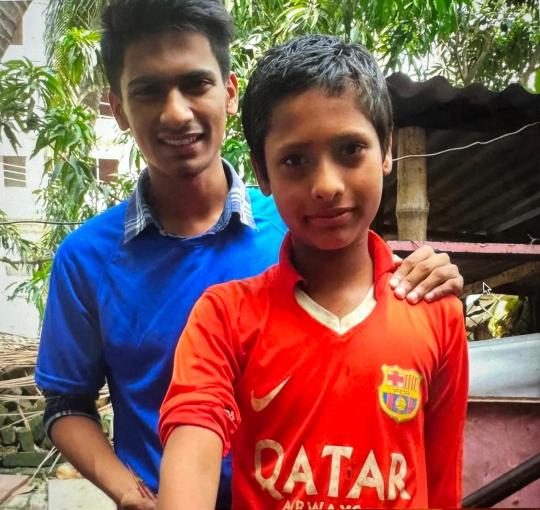
Dipto Shikha a nonprofit organization that works on social development with the slogan of ‘Let’s give a reason to smile’. One of the main tasks of their organization is to provide education to underprivileged children. In the Mirpur area, they have a school where over 40 children study up to fifth standard for free. Apart from elementary education, they can participate in extra-curricular activities as well.
Video of the children’s activity in the school:
youtube
Other than Mirpur they have 4 other mobile schools located in Gulistan, Mogbazar, Farmgate, Mohakhali Korai slums and Atibazar.
“The small NPOs are the ones who face more problems. There are more obstacles for them. One of the main reasons is mistrust. Due to some NGOs people are reluctant to trust the small NPOs. They don’t want to cooperate, instead sometimes create trouble.” he added.
While sharing about the experience of starting a mobile school in Kalashi, Tariqul Islam said, “There is a large slum in Kalashi. We took volunteers there to start a school for children. But even after perusing so much the people there refrained from helping us. Not only that, they even shooed us away from there”.
“Some of them were saying that they were the people from blood-sucking NGOs. These people have to exploit us more. Shoo them away,” said Tariqul.
Nevertheless, they go ahead with new encouragement instead of being frustrated.
But there are some opposite pictures as well. Ten year old Rahat studies in a school of Dipto Shikha since his father died. He has to look after the shop his father left behind. “Because of studying in Dipto Shikha now I can take care of the accounts myself”, said Rahat. there are many others like Rahat who have been benefited by such schooling.
Page 83|91
Picture: Rahat a student in Dipto Shikha.
“Kids Like Rahat are our inspiration. Their smile encourage us to continue these works even after facing so many obstacle”, said Tariqul.
Encouraging young people to volunteer, he said -
youtube
A photo story about some of their different programs -
youtube
Their path does not stop here. They want to go further to help people. Soon they will start working on some new projects. Here are some of their upcoming project plans- https://www.youtube.com/watch?v=vVmeQkK7TwM
Self-reflection-
1) How to write on NPOs
2) How to make graphical content
3) How to edit videos
4) How to add videos to complement the text
0 notes
Text
Cancer creating particles in detergents
Project description: For this major course of Business Journalism, we had to make a Video report that is relate to climate change from a business angle. We chose to make a report on Cancer creating particles in detergents which was a new issue at that time. We had to do it in groups of two. We interviewed related people including an expert.
Project Justification: As we had to make a video report on a topic related to climate change from a business angle, we chose Cancer creating particles in detergents. It’s not only related to climate change but also has a business angle. For this video we interviewed a student who discovered the fact and an expert on this topic.
Following is the video report-
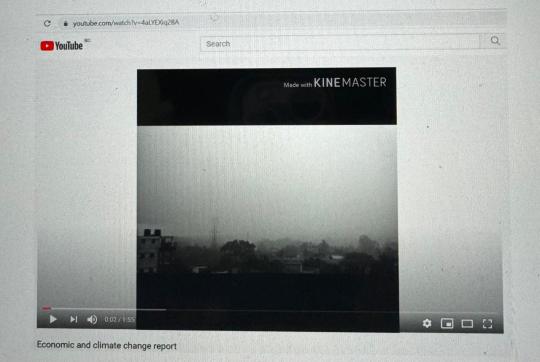
Video link- https://www.youtube.com/watch?v=4aLYEXiq2BA
Self-reflection
1) How to make a news on climate change
2) How to related climate change with business
3) How to edit videos
0 notes
Text
Housing Business

Project description: For this Business Journalism major course we had to make a TV news package that is based on some business. We were assigned in groups of two. As we were amid the pandemic situation, we tried to relate the news with it. So, we focused on housing business situation amidst the Covid-19.
Project justification: For this project we had to make a video news that is related to business. We chose to work on the housing business. We interviewed both houseowners and tenants and tried to portray the situation they are in currently. We also tried to show how Covid-19 is affecting these businesses.
Following is the video news-
Video link- https://www.youtube.com/watch?v=3TWPYYX-9Jw
How to make a TV news package
How to make voiceovers
How to make a news on housing business
0 notes
Text
“The real gain is that people are living though my food”
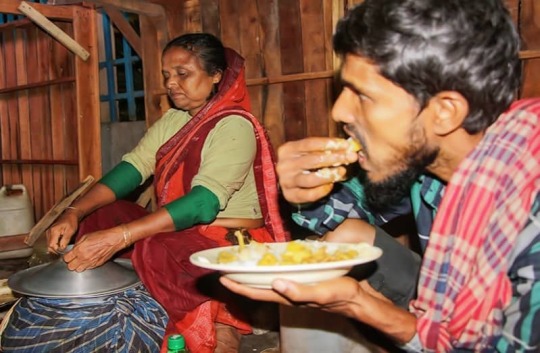
With 210 taka in the pocket, I was wondering in the Mohammadpur area and looking for a cheap place to eat lunch. On one side of Katasur, I saw a small hotel made of tin with a few tables inside. Thinking for a while I went inside. Along with rice, there was chicken, two types of vortas and pulses on my menu which cost me a total of 80 takas only. Afterwards, I learned that these hotels are the only hope for bachelor meals. Besides, many such hotels have been built keeping in mind the workers who eat here. Such an angle for business is considerably great.
The place we are talking about, there are eight such hotels counting within one kilometer of the area,. Later on, I found that the number of hotels in the entire Mohammadpur area is about 30-35, a large number of which is located in the Beribadh area. In a small place with four or five table and chairs, most people who come to eat are rickshaw pullers, van drivers, construction workers, bus-truck helper or street hawkers. The customers in the shops of the Mohammadpur bus stand streets adjacent are actually different. University students or office working bachelors are the main customers here. They can get food at a cheap rate from these places.
After talking to the hotel owners, I found that around four to seven thousand takas are traded on average every single day. Most of the time, the menu contains a few types of vorta, fish, meat, eggs, pulses and rice.
The hotels cost depends not on the situation of the hotel but on the location. However, the vorta ranges from ten takas to the maximum of twenty takas. More specifically the price of the dried fish (shutki) vorta is twenty takas. Chicken costs from forty to fifty takas, beef costs seventy to eighty takas and the cost of fish is twenty five to forty takas. Rice is ten takas per plate. And yes, of course, pulses are free!
How much does the hotels owners benefit from this business? Hotel owner Sikder Ali (47) of Beribadh area said, 'There isn’t much good business in the city for us. But still, at the end of the day, we get a profit of around two thousand. At the end of the month, after paying the rent, the salary of the employees and other expanse, it is still enough to survive.”
“The real gain is that people are living though my food”, said Rosina Begum, wife of Sikder Ali.
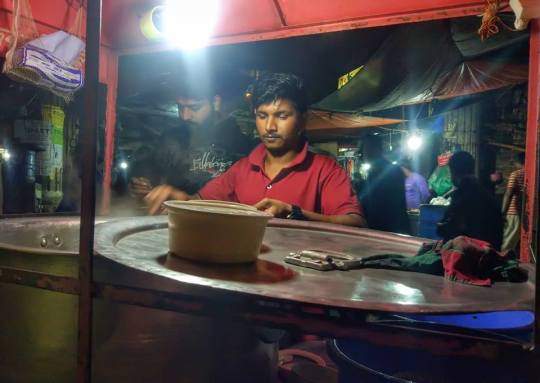
A little further from the Mohammadpur bus stand 'Hasib Biriyani House' is located. Although the business of Biriyani is not there anymore, Kamruzzaman is running Bhat Hotel after renting the shop. He informed that a large part of his customers are leguna drivers and helpers. Even some traffic police in duty sometimes eat here.
Kamruzzaman is satisfied with his business. He said, “Me along with an employee, run the whole hotel. Eight customers can eat at a time. Lunch and dinner is served here. Every day we bring about hundred peoples food. Until now, there have been no leftovers by the grace of Allah. Every day, I get around three thousand takas of profit.”
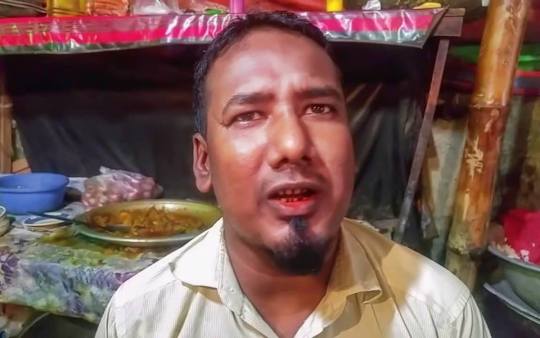
A large part of these hotel owners cook at their home and bring it to the hotel. So the cost is redacted and profit increases. Those who eat are also satisfied with the quality of the food. In this matter, I had a chat with Sifat Hasan.
He said, “I eat here twice a day. The daily cost is hundred to hundred and thirty taka. The food tastes like home food. I do not have any problems and the price is low too.”
He also added laughingly, “if you want you can eat on credit.”
But these middle class people did not forget to complain about their business. Most of them complain that they are not able to get a fixed position despite many lobbying. Contacting the City Corporation has been in vain. They are going to be victims of repeated harassment. The law enforcement agencies and government groups are also harassing them.
In this context, one hotel owner of Katasur, Afzal Rahman (51) said, "If you write these informations, then we might get in trouble again. But the thing is, almost all the hotels here give around five to eight thousand takas as protection money along with the rents.”
Shikder Ali made an even more surprising complain. He said, “Along with the protection money sometimes local gang members came and eat for free. We can’t say anything or the next day they will come and close the hotel. The police doesn’t help saying that the hotels are illegal.”
However the hotels are, they are place of relief for the bachelors. People like Shikder Ali and Kamruzzaman make their living based on these hotels.
0 notes
Text
Hello Everyone. My name is Marina Mitu. I will be talking about my most favorite hobby that is, travelling. But there was no tone of many other issues for several temporary problems. It is going to be very easy to go to the eastern place and can go a day. It can be said to be a lot of costs because it is very important for the students who carry themselves. Hope to give a lot of experience of a small tour that can be shortened in a short cost and a day.
0 notes
Text
Overcome the bystander effect
Have you ever seen someone collapsed on the side of the road but walked on by? Or ignored a person who’s fallen over? Maybe when you got home you thought, ‘I really should have done something’. This is the “bystander effect”. But don’t despair: by reading this you’re on track to never walk on by again.
If someone we know is hurt or in distress, we are likely to step in and help them. If we know exactly how to help them, we are even more likely to get involved.
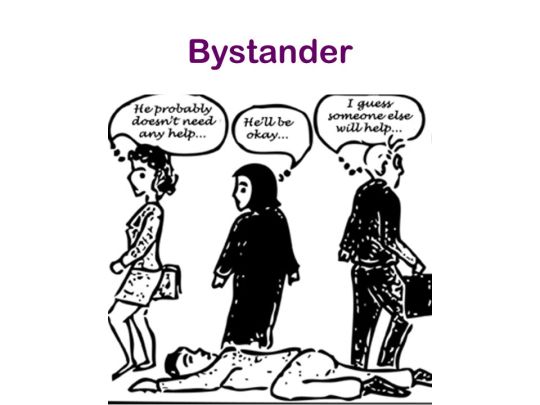
However, if we come across a stranger or someone we don’t know so well who appears to be hurt or in distress, we might not want to approach them.
There could be good reason for this. For example, we might judge the situation to be too dangerous. But at other times our reluctance is unwarranted.
We might convince ourselves someone else will come to that person’s aid instead. Or we might think that we don’t have time to help – or even know how to.
What is the bystander effect?
The bystander effect is about the reluctance of bystanders to get involved in an emergency, including a first aid emergency.
It’s more likely to occur in situations where you might not feel so responsible for helping, such as if there are lots of other people around who are perfectly capable of helping instead. If no one else is stepping forward, why should you?
In fact, the more people who are present in a first aid emergency, the less likely an individual is to take action and help.
The problem is it means people who need help simply don’t get it. And that can have serious consequences.

Imagine if you were on a night out but fainted and no one came to help you? Or if your dad fell off his bike at a busy roundabout and people drove past him?
The good news is simply being aware of the bystander effect increases the likelihood of overcoming it and taking action the next time you’re in this kind of situation.
If your first aid is a little rusty, you can still call 999 for help. And if you act in good faith to try to help someone who’s hurt, they and their family are likely to be very grateful – especially if you save their life.
Example of the Bystander Effect
The most frequently cited example of the bystander effect in introductory psychology textbooks is the brutal murder of a young woman named Catherine "Kitty" Genovese. On Friday, March 13, 1964, 28-year-old Genovese was returning home from work. As she approached her apartment entrance, she was attacked and stabbed by a man later identified as Winston Moseley.
Despite Genovese’s repeated calls for help, none of the dozen or so people in the nearby apartment building who heard her cries called the police to report the incident. The attack first began at 3:20 AM, but it was not until 3:50 AM that someone first contacted police.
Initially reported in a 1964 New York Times article, the story sensationalized the case and reported a number of factual inaccuracies. While frequently cited in psychology textbooks, an article in the September 2007 issue of American Psychologist concluded that the story is largely misrepresented mostly due to the inaccuracies repeatedly published in newspaper articles and psychology textbooks.
While Genovese's case has been subject to numerous misrepresentations and inaccuracies, there have been numerous other cases reported in recent years. The bystander effect can clearly have a powerful impact on social behavior, but why exactly does it happen? Why don't we help when we are part of a crowd?
Brush up on first aid
You don’t need to know first aid to step forward and help someone. However, knowing some first aid will make you feel more confident and increase the chance of you stepping forward to help.
Those could potentially help save someone’s life.
Like-
Turning an unresponsive person who is breathing on their side and tilting their head back to open their airway.
Applying pressure to a heavy bleed to help stem the flow of blood.
0 notes